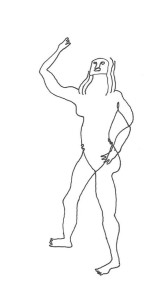Tag : mastectomy
November 6, 2019 by admin
Scenes From a Mastectomy

Vision: my breast as the Tabernacle. Open. My lungs like the scrolls of the Torah. But a Torah without end whose scrolls are imprinted and unfurled throughout time…
—Helene Cixous, Coming to Writing, and Other Essays
The greatest kind of courage. The courage to be afraid.
— ibid
Nobody will believe me if I say this. Whenever I think of my mastectomy, I find myself smiling. As if it were a comedy. Is it simply because I survived, and six years later I am still glad to taste the preciousness of life? Is it that I feel like the hero of my own drama, taking my bows?
Is it that I wrote a sequence of poems about my mastectomy, and they turned out to be such good poems that I am grateful to the cancer?
Is it that I was surprised by the love I received, the love I experienced, the resilience I found I possessed, the capacity for healing? Is it that we rise, in crisis, like a wood chip lifted by a wave? Is it that whatever doesn’t kill you, as the saying goes, makes you stronger?
Or do I smile in order not to collapse in guilty grief at the thought of the dead?
It is the weekend before my mastectomy. It is important not to say hospitalization, not to say surgery, but to say mastectomy. The technical, the clear, the precise word. I fight to say it, not to be ashamed. To love myself courageously I must say mastectomy plainly. I go to Clayton’s and buy hot pink pajamas for the hospital, satiny with soft flannel inside. They will be part of my fight to love myself. They will make me look sleek and gorgeous. On the phone to a dozen people, I am told a dozen stories, heroic, pathetic, infuriating. One woman’s survival for years beyond what the doctors told her she would have. Another woman’s experience of waking up without a breast when she thought she was merely receiving a biopsy. Stories of lumps the size of golf balls materializing overnight. Stories involving pus, blood, vomit. Stories about women organizing to demand more research into the causes of breast cancer. Women on chemo, women covering or refusing to cover their baldness. Women whose grandmothers, mothers, sisters have died, who live in dread of the song of their genes. These are the invisible webs women weave together. We spin our secret filaments, filiations, out of the earshot of men. Men who would be scandalized, men who would be horrified, to hear us speak as we do about our bodies. To hear us speak, cackle, whisper and roar as we do about birth, about sex, about sickness. Men who are afraid of blood. Centuries, millennia, of women’s secrets, forced into hiding by men’s dread of our bleeding. Of the phantoms we live among, perhaps the greatest, the oldest, is the colossus of the bloody goddess. Invisible to her children, she bestrides civilization. Her body empties itself and heals but is never closed, it pours forth milk and blood continuously, and we rational beings cannot bear it. We refuse her worship. We pretend she does not exist. The talk that circulates among women—the private telling— is a faint echo of a once-universal psalm of praise and fear, now indescribable.
As soon as I am able to touch it, I resolve to caress this flatness. My chest, my dead-feeling armpit, my arm, all that remains. I run my fingers over the area, petting it, caressing it, letting it know that I am not angry, that it is still my body, that I still love it. I tell a friend that I am doing this, caressing the place where there is no longer a breast, for which there is no name. I press my fingers gently all around the scar, I squeeze my armpit. My friend is surprised.
But if I cannot love my body, I cannot heal.
Once I began wearing the falsie inside my left bra cup, Jerry made a habit of hugging me, squeezing one breast or the other, and saying “Is this the real one? I can’t tell the difference.” Dear Jerry. In bed he fondles the one that remains, and insists that one is just as good as two. I make it a habit to look at myself nude in the mirror until I no longer flinch. I continue to caress my own body, the flat as well as the round, the numb armpit that begins almost to know when it is being squeezed. Sheila’s friend Bev calls to check on me, and reminds me that a woman is really the same person after a mastectomy as before. Bev, I reply, you are so good to call. Thank you. She says the wrinkles in her face make her feel worse than the missing breast.
The Biblical King David, when his infant son fell ill, fasted and wept, praying for the child’s recovery. When informed after seven days that the infant had died, he rose, dressed himself in fine fresh raiment, and ate heartily. His courtiers were scandalized, but the king explained: “While the child was alive, I fasted and wept, thinking perhaps the Lord will have pity on me and let him live. But now that he is dead, can I bring him back again? I shall go to him, but he shall not return to me.” In the same way, I mourned and wept for my breast before I lost it, and when it was gone, I set my spirit to healing.
\Alicia Ostriker is a poet and critic. Her new collection, The Volcano and After: Selected and New Poems, 2002–2019, is out in 2020. A version of this piece appeared in Living on the Margins: Women Writers on Breast Cancer, ed. Hilda Raz (Persea Books, 1999).
- No Comments
 Please wait...
Please wait...